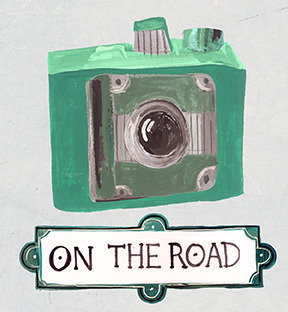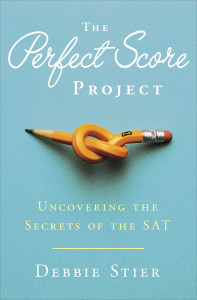Debbie Stier's Blog, page 4
May 15, 2014
Love It And It Will Love You Back

How can developing a love for the test material turn the SAT preparation into a positive experience for young people?
I always say, “love it and it will love you back.”
“Love” (I’m obviously using the word loosely here) is where the rubber meets the road -- whether we’re talking about cooking, studying, or getting in shape. My experience is that I achieve more if I can somehow find the love for what I’m doing.
I used to run a book publicity department, and the publicists would often come into my office and say some variation of, “I hate the book,” an attitude I knew from personal experience had to be fixed. So I’d start with questions and wouldn’t stop until we found something positive for them to latch onto, because I knew there was no way for them to do a good job without. “Can you love the author?” I’d ask. If the answer was “no,” I’d go further: “What about author’s husband/dog/editor?” We’d always find something positive for them to focus on.
I think the same goes for school. My kids will sometimes say, “I hate this or that assignment, or teacher, or book,” I always come back with the same idea: “Can you stay open to the possibility that we might find something for you to love about it?” which will usually get me a “yes.” Then I go down the list.
For the SAT, I might ask, “do you like the idea of getting into your first-choice college with scholarship money?” (That sounds good, right?!)
Telling students to try to think of the SAT as a game to beat, or a crossword puzzle or Sudoku or video game might make it more fun.
One final note: not being prepared is a miserable experience no matter how you slice it. I don’t think there is any way to cram for the SAT and feel good about it. Students should give themselves a nice long runway if for no other reason than to have a positive experience taking the test. Being prepared feels good.
...................................................
From Education Week Q & A. You can read the rest of the interview here: Education Week Part I and Education Week Part II.
..................................................
Illustrations by Jennifer Orkin Lewis.
The post Love It And It Will Love You Back appeared first on Perfect Score Project.






May 14, 2014
Why Would A Mother Take the SAT … 7 Times?

Updated the About page (finally):
What is The Perfect Score Project?
In a nutshell, the project was initially an attempt to motivate my teenage son, Ethan, to care about the SAT enough to study hard and reach his potential.
Since I had no idea what that would entail, I started my research by subscribing to the College Board’s SAT Question-of-the-Day – which, to my surprise, I found myself enjoying. The questions were like a little puzzle first thing each morning, and a week or so in, I got hooked and, in a moment of unbridled enthusiasm, declared I was going to try to get the perfect SAT score. “Training” for the SAT became a personal challenge, like training to run the Marathon (which I did in 2004).
Just to clarify -- I didn’t expect Ethan to pull off a perfect SAT score. Eventually he came up with his own goal, which we both agreed was the right one.
Not too long after I decided I would take the SAT myself, my personal project became a book project, for which I took the SAT every time it was offered in 2011 (7 times in all), the year before my son would be taking the SAT. I also took the test at 5 different testing locations. At that point the project turned into a kind of “consumer reports” on test prep and the test itself.
But the real miracle of our family SAT project, which I didn’t anticipate, wasn’t our score gains (although our score gains were hundreds of points more than the College Board reports average score gains to be after test prep). The real magic was that my teenage son morphed from a happy-go-lucky little tadpole, perfectly happy to slide by in school doing the least amount possible, into a goal-oriented and motivated young man. Ethan really learned for the first time how to work, and he gained confidence by reaching (actually, surpassing) his own score goal. He ended up using in school the lessons he learned from the SAT project, and ultimately finished high school with his highest GPA ever, post-SAT. He entered college with expectations and confidence I don’t think he would have had had we not done the family SAT project together.
The profound affect on Ethan’s study habits was the best part of the whole project (and our score gains were significant!).
Ethan, like most teenagers, had trouble seeing into the future and envisioning how a standardized test taken at age 15 might serve as an important opportunity (or liability) in his future. He was not one of the stressed-out striver kids I’d been reading about. When it came to school, Ethan was “a crammer.” He got mostly B’s with the occasional A and C thrown in for good measure.
By the time I reached adulthood, I was hard-working and goal-oriented, but my hard work mostly took place out of sight, in my office at work. Everything changed when I studied for the SAT. I was right under Ethan’s nose (or in front of it, literally). When he saw me studying and my scores increasing, it registered, probably more than he let on at the time.
Ultimately, Ethan set his own SAT score goal, which we agreed on, and mapped out a study plan, which he stuck to. His plan was methodical and long-term, lasting almost an entire year, and it required a lot of hard work and sacrifice. Ethan missed out on many Friday night parties because he’d scheduled full, timed practice SATs for Saturday mornings during the school year. In the beginning, of course, this was a bitter pill to swallow. Hanging out with mom on Friday night was not his idea of a good time.
We plotted his scores on a graph, and a few months into his plan he saw the line going in the right direction. That motivated him. He loved to study his numbers on those graphs!
Ultimately, he beat his score goal by 30 points, which was somewhat surprising to me because he’d had a few 11th hour, unexpected snafu’s (a broken “SAT hand,” an emergency root canal after the test, etc.), but the confidence he gained from reaching his goal was marked. I don’t think he’d ever accomplished a big goal like that, and I’m not sure he really believed he could.
Before the project, Ethan thought that if someone did better than he did in school, it was because they were smarter than he was. “Not true,” I’d tell him (as I’m sure most mothers would say). “They studied harder than you,” I’d tell him. After achieving his goal, Ethan started to believe that he could “do it” (whatever “it” might be) through goal-setting, mapping a methodical plan, and then following through on that plan.
The project taught Ethan he could achieve much more than he thought he could through sustained hard work. He took that work ethic with him through the rest of high school, and his GPA improved as a result. He’s also continued to employ that strategy in college.
...................................................
I wrote a book about the journey called The Perfect Score Project, which was published by Harmony Books (a Division of the Crown Publishing Group) in February 2014.
You can read the prologue, listen to an audio clip, and check out the reader reviews.
The book is a hybrid: part guide to decoding (and acing) the SAT/part memoir. It's the story of how I grew as a mother, and how my son and I managed to eek some joy out of the SAT process. It's also a toolbox filled with tips I learned about the SAT--things I might not have thought of, such as What makes a good testing location...or The truth about brand-name SAT prep...or How to know if you should self-study, take a class, or use a tutor...
Ultimately, the book is about how I managed to motivate my teenage son to care about the SAT--and, to rescue him from...sliding by.
.......................
For press inquiries, contact: Ellen Folan 212-782-8944 efolan@randomhouse.com
For more press materials, click on the Press Kit page.
For speaking engagements please visit my Speaking Page and contact Jamie Brickhouse at the redBrick Agency 646.281.9041
.......................
All of the fabulous illustrations on this site are hand painted by Jennifer Orkin Lewis.
The post Why Would A Mother Take the SAT … 7 Times? appeared first on Perfect Score Project.






May 13, 2014
How Can Parents Help Children Prepare for the SAT?

1) As early as 9th grade, start reading one article per day together from a periodical such as the New York Times (or another publication with comparable reading level) and identify the main point as well as unfamiliar vocabulary. The SAT critical reading section is a vocabulary based reasoning test. Most of the passages are college-level non-fiction, which is not what most high school students are used to reading. Learning new words in context is easier than memorizing vocabulary from flashcards because the associations are richer and background knowledge is critical for reading comprehension.
2) Make sure your child has a solid foundation all the way through school so that you don’t enter high school (or, 11th grade), with holes in the foundation. Kumon is a great way to shore up the math, but start early. If you wait until high school, it’s harder to instill those habits. (Though not impossible. See Chapter 14 for one example of a teenage turnaround.)
3) If you want to know how solid the foundation is, having someone administer the Iowa achievement tests, and go from there.
4) Don’t assume that the SAT has to be a reviled right of passage. The test is the last big milestone before your child leaves for college. It is possible to turn it into a positive experience. Trust me, if I did it, anyone can.
...................................................
This is one (of many) questions from an Education Week Q & A. You can read the rest of them here: Education Week Part I and Education Week Part II.
..................................................
Illustrations by Jennifer Orkin Lewis.
The post How Can Parents Help Children Prepare for the SAT? appeared first on Perfect Score Project.






May 9, 2014
What’s New?
I've been so busy ... events, media, moving, writing, picking son up from college ... blah blah blah. So busy, that I haven't posted anything here in way too long.
I realized after the 20th time someone said, "You were on the Today Show? Why didn't you tell me?" that I need to post the interviews I've done.
So, voila, with big big big thanks to the Crown Publicity team.
Download press materials for The Perfect Score Project and read the prologue.
Bloomberg TV:


Click here to view.

Better Show
PRINT:
New York Observer - May 7, 2014
Reuters - April 21, 2014
CBS Money Watch - April 16, 2014
The Rivertowns Enterprise - March 14, 2014

March 3, 2014
Must read responses to story in The Mail
If you read The New Yorker story, you should also read this blog post, written by Erica Meltzer. Her commentary is well worth reading.
February 25, 2014
If you read the Atlantic, be sure to read Erica Meltzer's blog post. As usual, her commentary is well worth the read. 
February 28, 2014
March 1, 2014
March 4, 2014
December 18, 2013
March 2, 2014
March 1, 2014
March 14, 2014
March 6, 2014
RADIO:
KCRW/Los Angeles Public Radio
WPR/Wisconsin Public Radio
WUWM/Milwaukee
WLS/Chicago
WILK/Scranton - W. Barre
WLW/Cincinnati
WJR/Detroit
BLOGS:
Everyday I Write the Book (Q&A) - April 16, 2014
Everyday I Write the Book - March 31, 2014
Off The Shelf (Part 2) - March 27, 2014
Off The Shelf - March 26, 2014
Education Week (Part 2) - March 27, 2014
Education Week - March 25, 2014
Owl Haven - March 20, 2014
Reading & Eating - March 20, 2014
College Admission - March 19, 2014
Gotham Gal - February 27, 2014
Shelf Awareness - March 4, 2014
Book Page - March 2014
Karen's Korner - January 23, 2014
Electively Paige - February 9, 2014
Every Day is A Gift - December 25, 2013
Moms Who Homeschool - December 30, 2013
Best Life Mistake - February 14, 2014
Learning Table Reviews - February 13, 2014
Smarter Bodies - March 3, 2014
Debbie's Homeschool Corner - January 8, 2014
Milk Donor Mama - December 5, 2013
Red Horse Tutoring
Bloggers Recommend - February 25, 2014
Our Families Adventure - January 30, 2014
Abacus Mom - January 30, 2014
Memories from Books - January 25, 2014
The post What’s New? appeared first on Perfect Score Project.






March 24, 2014
Are you a “helicopter mom?”
From Bloomberg Television's "Taking Stock" with Bill Cohan and Carol Massar.
The post Are you a “helicopter mom?” appeared first on Perfect Score Project.






March 23, 2014
Discussing the SAT on Milwaukee Public Radio’s Lake Effect

Is the SAT disconnected from what goes on in school?
Do I want to try the new SAT?
What about that essay?
Kreigh Knerr and I discuss the SAT with host Mitch Teich on Milwaukee Public Radio's Lake Effect.
.......................................
I did a Q & A with Gretchen Rubin about "habits." Apparently, I'm "a questionner." You can read the full Q & A here.
....................................
Click on the links to download "Sample SAT Advice" and an "Audience SAT."
If you're interested in scheduling an event, please contact Jamie Brickhouse at the redBrick Agency 646.281.9041.
.......................................
Illustrations by Jennifer Orkin Lewis.
The post Discussing the SAT on Milwaukee Public Radio’s Lake Effect appeared first on Perfect Score Project.






March 21, 2014
One Person’s Obstacle is Another Person’s Springboard

Mail responses to The New Yorker SAT story:


.......................................
Erica Meltzer's blog post in response to The New Yorker SAT story: What Exactly Does Elizabeth Kolbert Consider "Critical Thinking?
[snip]
What's interesting to me about Kolbert's article, however, is how it embodies some of the central tropes and contradictions that inevitably run through discussions about the SAT.
[snip]
More worrisome, however, is Kolbert's implicit attitude that anything that fails to test imagination and creativity must be bad. Imagination and creativity are of course good things, but not in every situation (would you really want a nuclear power plant operator who suddenly decided to get creative?).
[snip]
What is most interesting, though, is Kolbert's use of the term "critical thinking." Notably, she fails to define the term -- apparently she considers it so self-explanatory as to be unworthy of a definition. This is, of course, hardly a surprise; most of the people who criticize schools, the SAT, etc. for failing to promote "critical thinking" rarely bother to give actual examples of what they mean by the term.
Click here to read the entire post.
.......................................
Kreigh Knerr and I were interviewed on Milwaukee Public Radio's The Lake Effect.
.......................................
.......................................
Illustrations by Jennifer Orkin Lewis.
The post One Person’s Obstacle is Another Person’s Springboard appeared first on Perfect Score Project.






March 18, 2014
SAT Advice

I'm in the process of pulling together "hand outs" for my upcoming SAT talks and realized I should post them for those who can't be there.
I'll be speaking in West Windsor-Plainsboro (PTSA) Wednesday night (3/19) and at the Irvington Library on Thursday evening (3/20).
To find out more about having me speak, click here. If you're interested in scheduling an event, please contact Jamie Brickhouse at the redBrick Agency 646.281.9041
...............................................
Sample SAT Advice
from The Perfect Score Project
What’s the one thing you should know about the SAT? (see page 14)
It’s essential to endurance train (i.e., take full, timed practice tests). The SAT is every bit as much about performance on test day as it is about the knowledge being tested.
Experienced tutors advise taking ten to fifteen full practice tests.
Review all of your mistakes until you can explain them to someone else.
Keep track of errors and guesses by category (e.g., four subject-verb agreement mistakes).
Mimic the actual test conditions as closely as possible.
...............................................
Signs of Good vs. Bad Test Prep: (see page 140)
Signs of good test prep:
Refers back to the Blue Book. Helps student interpret the Blue Book.
Recommends official College Board material for the diagnostic test and full official practice tests.
Includes goal-setting strategy.
Addresses fundamental skills as well as test strategy.
Signs of bad test prep:
Mock SAT used for diagnostic test. Unofficial tests are sometimes more difficult than the real SAT in order to inflate score gains.
Money-back guarantee. Usually misleading.
Credentials should include SAT-specific background. Don’t assume a Ph.D. signals “SAT mastery.”
...............................................
Five Essential Questions to Ask a Potential Tutor: (see pages 153-4)
Do you customize your approach? If so, how?
What is your average score gain per student?
How long do you advise students to prepare for the SAT and how much will it cost?
What test-prep materials do you use? (If it’s not official College Board material, be wary.)
How much homework do you assign between sessions?
...............................................
What can I do with my kids to improve their vocabulary? (see Chapter 16)
The SAT critical reading section is a vocabulary-based reasoning test. Most of the passages are college-level nonfiction, which is not what most high school students are used to reading. As early as ninth grade, have your child pick one article a day from a periodical such as the New York Times (or another publication with comparable reading level) and identify the main point as well as unfamiliar vocabulary.
Learning new words in context is easier than memorizing vocabulary from flashcards because the associations are richer and background knowledge is critical for reading comprehension.
It’s a great exercise—and gives you quality time together!
...............................................
Does test location matter? (see pages 20 & 240)
Location matters! Don’t assume “fancy school” means “best test location.” Look for the following characteristics and confirm by contacting the test center supervisor (whose information can be found by calling the school in question):
Tests should be taken in classrooms, which have fewer distractions than gyms and cafeterias.
Full-size desks and chairs, not tablet desks, in all test rooms.
Visible clock in all test rooms.
Chalk or white board on which the end time for each section will be displayed.
...............................................
What are good snacks to bring on test day? (see page 30)
After sampling everything from Red Bull to peanut butter over the course of the project, I recommend these favorites for boosting energy and warding off hunger:
Dark chocolate—70% cocoa or higher.
Sliced red apple—studies confirm that apples are superb at warding off hunger.
Listerine strips—an energizing pick-me-up.
Water—I’m certain water makes me think more clearly.
....................................
Here are downloadable versions of "Sample SAT Advice" as well as the "Audience SAT" that I'll be handing out and discussing.
You can find out more on the "Speaking" page.
....................................
I did a Q & A with Gretchen Rubin about "habits." Apparently, I'm "a questionner." You can read the full Q & A here.
....................................
Illustrations by Jennifer Orkin Lewis.
The post SAT Advice appeared first on Perfect Score Project.






March 13, 2014
Do I Feel Smarter After Taking the SAT 7 Times?

Maybe.
You'll have to listen to this 4-minute audio clip from the Q & A after a reading the other night at Spoken Interludes to find out.
Big thanks to DeLauné Michel for inviting me to participate in her critically acclaimed literary salon. I can honestly say now, it's official: I'm an author.
.......................................
Click here to see why I think Ellen Folan is god's gift to authors.
Check out the "Reader Reviews" on Amazon and Goodreads.
And go to August Wren to see more about the fabulous illustrator who paints all of the illos on my website.
The post Do I Feel Smarter After Taking the SAT 7 Times? appeared first on Perfect Score Project.






March 6, 2014
Test Day Advice for the SAT

Are you taking the SAT this Saturday? If so, A) good luck, and B) check out these blog posts for advice to optimize your testing experience.
Avoid Careless Errors -- Read every word in the question and answer choice, don't get stuck on a question, use your calculator (even for the easy ones), and more. Click here to read more about how to avoid stupid mistakes.
Top 5 Tips for Test Day -- Sit in the front row (fewer distractions), keep your own time, and bring the right snacks. Click here to read more of the top 5 test day tips.
The Night Before the SAT -- Don't answer the phone, don't go on Facebook, or Twitter. And remember, there are no new questions. Click here to read more about what to do the night before the SAT.
5 SAT Tips You May Not Have Thought Of -- Write your thesis at the top of your essay paper and circle back to that thesis in every paragraph. Make sure to turn the last page of every section (especially at the end of the test, when you're tired), and, say something to the proctor if there's noise in the room that's bothering you. Click here to read more test day tips you may not have thought of.
The Best SAT Snacks -- Don't bring a 3 course meal (like I did at my first SAT). You have three (minuscule) 5-minute breaks and trust me, they go by fast. This post includes the best food for the SAT (i.e. energizing, filling, can be eaten on a run to/from the bathroom, etc.).
Test Taker Rights -- I had a really bad SAT experience ... once (out of 7). Tons of other people wrote to me about their SAT horror stories after I posted my story. Don't let that happen to you! Know your test taker rights. You are entitled to: a quiet room, 5 minute warnings, and a proctor who pays attention! Click here to learn more about your rights as a test taker.
Keep Your Own Time -- Bring a Swatch (or some other time keeper that doesn't beep and isn't a phone. No phones allowed.) And, keep your own time. See my "really bad SAT experience" if you need more convincing about this, and click here to read Stacey Howe-Lott's super-essential-I-can't-believe-I-didn't-think-of-that-myself method for keeping time during the SAT.
Good luck if you're taking the SAT this Saturday!
And don't forget: B R E A T H E
.................................................
You'll find tons of SAT tips in my new book, The Perfect Score Project. Plus, the story of why I took the SAT 7 times in one year, and, everything I learned about the SAT, test prep, and how to motivate my teenage son.
You can check out the reader reviews on Amazon and Goodreads and read/watch/listen to some recent interviews about the project.
.................................................
The illos on this site are all hand-painted by my dear friend Jennifer Orkin Lewis, who also happens to be a character in the book.
My friend Catherine is also a character. Catherine's a warrior who's worth reading. You can usually find her blogging on Kitchen Table Math.
The post Test Day Advice for the SAT appeared first on Perfect Score Project.











